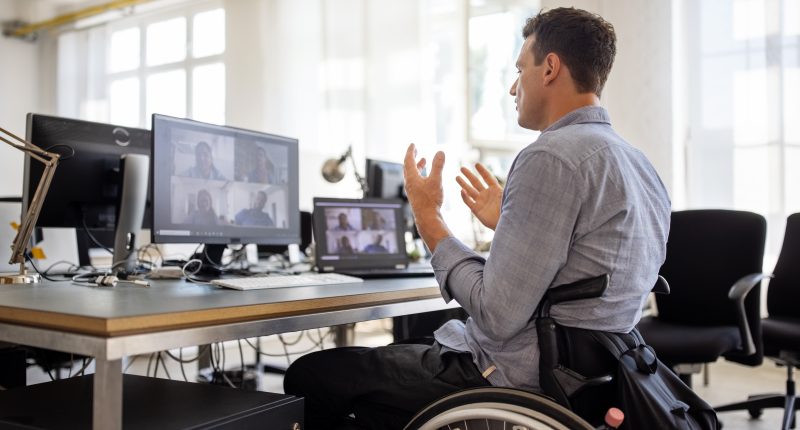ONE in five working adults is disabled but when it comes to jobs there is a double-discrimination trap.
Firstly, only around 50 per cent of disabled people are in work, compared to 81 per cent of non-disabled people, creating a huge employment gap.
Plus new research from the Trade Union Congress reveals a 14.6 per cent pay difference between non-disabled and disabled workers — higher than it was a decade ago.
The report estimates an average £3,460-a-year difference for someone working a 35-hour week, meaning disabled people effectively work for free for the last 47 days of the year.
The biggest reported pay gap is in the financial services sector, with disabled staff earning on average a third less.
Employment expert Kate Palmer from law consultancy Peninsula explains: “Disability is one of the nine protected characteristics under the Equality Act 2010.
READ MORE EMPLOYMENTS NEWS
“Employers have a legal duty to make reasonable adjustments for any employees who could otherwise face a substantial disadvantage because of a disability.
“Paying an employee less because of their disability will likely be discriminatory.
“Employers should, therefore, look at their organisation and the support that they provide to aid employee progression.”
Minister for Disabled People, Tom Pursglove, said: “We’re here to support anyone who wants to start or stay in work, from our variety of programmes to help disabled people and people with long-term health conditions to our advisers in jobcentres.
Most read in Money
“Employers also have a huge part to play and I’d encourage businesses to sign up to the Disability Confident scheme to help them recruit great employees.”
THIS Sunday is International Day Of Persons With Disabilities, a United Nations-backed initiative to break down barriers and up employment rates.
We asked the UK’s only blind female CEO, Sandi Wassmer, from the Employers Network for Equality And Inclusion, to show how to support disabled staff and close these gaps.
You can see her tips down the page.
Sandi said: “The disability employment gap means there are 4.79million talented people that employers are missing out on.
“Nine per cent of children in the UK have a disability, so it is imperative that disabled kids and young people are given the right support and opportunities in early life so that they can develop the skills and confidence required for when they later enter the job market.”
HOW TO MAKE A DIFFERENCE
HERE are Sandi Wassmer’s top tips for employers.
See the ability, not the disability: Disabled people have diverse approaches, views and experiences to offer.
Their range of knowledge, abilities and expertise will add creativity and innovation.
- A disability isn’t a negative thing: Consider the multitude of neurodiverse people who have intense focus and problem solve faster than others.
- Get access to a wider talent pool: With employers struggling to fill vacancies, reducing the disability gap is key to accessing the best talent pool possible.
- Most accommodations for disabled people are simple and inexpensive: 80 per cent of disabled employees do not need any. For those who do, the average cost is £80.
- Check your unconscious biases: One of the biggest barriers disabled people face is other people’s attitudes.
- Remember, disabled people are just people: Like everybody, they are living their lives and trying to be happy.
Jobspot
CAREERSWITHDISABILITIES.COM has more than 700 live vacancies from organisations including Sky and HM Treasury.
FOCUS ON ‘CAN’ NOT ‘CAN NOT’
IF you are disabled, looking for work can be tough.
Here, Rebecca Owen, senior operations manager at the DWP, shares her advice for landing that dream job.
- Focus on what you can do rather than what you can’t. With support and reasonable adjustments in place there will be a job you can do.
- Complete the Health Adjustment Passport at gov.uk. This will help you identify the extra support you need to move into or stay in work. It helps support conversations with employers about reasonable adjustments and will help with applications to Access To Work.
- Take it slow and steady – don’t take on too much too soon. Consider voluntary work to build your confidence and wellbeing.
Work trials and placements are a great way to test what works and what you enjoy – especially if it is a new type of role. - Only done one type of job? Don’t be afraid to try something new. You will have skills and experiences that can be transferred to other roles.
- Explain to potential employers what you need and how they can support you. Utilise the support with the employee health and disability page on gov.uk.
- Both employers and employees should lobby for the company to become a Disability Confident employer.
The Access To Work scheme offers grants to help disabled people back into work and explains how to educate staff on hidden disabilities.
Being curious and having conversations helps to promote inclusivity.
Jobspot
SEARCH for jobs from hundreds of inclusive firms at DISABILITYJOB.CO.UK
STUDENT PLANNER
THOUSANDS of disabled people at university and in higher education will benefit from a new government planner to ease their transition into work.
Following a successful pilot, the DWP Adjustment Planner will be rolled out to all students.
It gathers together each person’s relevant needs which can then be passed on to employers, ending the need for repeated assessments and finding out what they need to do their job.
Minister for Disabled People, Health and Work, Tom Pursglove, said: “Searching for a job post-university as a disabled student can be stressful.
“But our new Adjustment Planner has been proven to help more disabled people to start, stay and succeed in work.”
UNTAPPED TALENT
RECRUITMENT outfit The Page Group has an internal employee network to help staff and clients with disabilities.
Bolu Faseun, senior diversity, equality and inclusivity manager, said: “Enhancing the inclusivity of your organisation for individuals with disabilities is not only a morally sound decision but also a strategic move to tap into an untapped talent pool.
“Individuals with disabilities often possess remarkable soft skill sets, having learned to navigate a world that may not always be accommodating to them.
Read More on The Sun
“The emotional intelligence they’ve cultivated in order to thrive in such an environment often translates into robust management skills.”
You can find out more at tinyurl.com/yckd8nfz.
This post first appeared on thesun.co.uk












